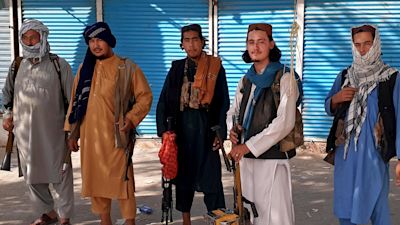LGBT+ Afghans trapped under Taliban rule face 'massacre' if more is not done to help them

Words by ITV News Digital Journalist Jocelyn Evans
Six months on from the final evacuation flight leaving Afghanistan, LGBT+ people trapped under the Taliban's rule in the country have lost all hope.
In August, we heard about a gay man living in Kabul who was "raped and beaten" by the Taliban. And there's no end in sight for such atrocities.
Artemis Akbary, an Afghan LGBT+ rights activist based in Czech Republic, receives messages every day from desperate Afghans trying to get passports, funds to travel, offer of asylum, or just any glimmer of hope.
"If we don't do something for them, they will be massacred by Taliban," he says.
The majority are "hopeless," Artemis warns, with many people considering taking their own lives, before the Taliban can.
He spoke of one transgender woman who was arrested by the Taliban in Herat province, "we don't know if she's alive".
One man was flogged 80 times after the Taliban found LGBT+ content on his phone when they searched him at a checkpoint. The photographs show his lower back beaten, purple with bruising.
He says he "cannot survive this situation much longer".
Another man, stopped at a checkpoint by the Taliban for having a voice "like a girl", was beaten with the stock of a rifle. Photographs show the 20-year-old covered in his own blood, his nose and hair thick with it.
These accounts of abuse, sexual assault, threats, arrest (the list goes on) have been documented by a recent Human Rights Watch report, which concluded LGBT+ people in Afghanistan are facing an "increasingly desperate situation and grave threats to their safety and lives".
'Even If You Go to the Skies, We’ll Find You': LGBT+ People in Afghanistan After the Taliban Takeover
"The danger now facing LGBT people in Afghanistan - in an environment devoid of legal protections, under authorities that have explicitly pledged not to tolerate LGBT people - is grave," the report warned.
A Taliban spokesman previously told the Guardian LGBT+ rights would not be respected.
European asylum is one of the only safe routes for LGBT+ Afghan refugees as the situation in neighbouring countries is hostile.
Iran, Pakistan, Turkmenistan and Uzbekistan all criminalise same-sex relations. In Iran, same-sex acts are punishable by death.
Artemis says a number of his friends are "living in limbo" in these countries, waiting for asylum with the hope of getting to Europe.
"People escaped to Iran illegally and are now stuck, if they're arrested they'll be deported back to Afghanistan," he warns.
His organisation, Afghan LGBT, provides funds and support to LGBT+ people stuck in the country and neighbouring countries - as well as trying to raise awareness to their plight. The group also runs a radio station for LGBT Afghans and Iranians.
Have vulnerable LGBT+ Afghans been offered safe refuge?
The UK is the only country to publicly announce it has resettled a group of LGBT+ Afghans, according to the Human Rights Watch.
In October 2021, a group of 29 LGBT+ refugees arrived in the UK. At the time, the foreign office said more vulnerable LGBT+ Afghans were expected to arrive in the UK in the coming months.
Asked on February 1 2022 if that had happened, the Foreign Office did not give any update on the number of LGBT+ Afghans brought to the UK.
It said the Afghan Citizens Resettlement Scheme (ACRS) will provide protection for people at risk and identified as in need, with plans to exceed the initial aim of resettling 5,000 people in the first year.
An FCDO spokesperson said: "Britain is a fierce champion of freedom and the right of all people to be themselves and love who they want free from persecution. We played a key role getting these people out and will continue to do all we can to help at-risk Afghans leave the country."